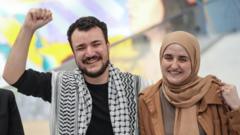Columbia University activist Mahmoud Khalil has returned from immigration detention with a powerful message aimed at the Trump administration, asserting its failure to silence pro-Palestinian voices. Khalil, who was detained for over three months, expressed his sentiments shortly after arriving in Newark, New Jersey. "My existence is a message," he declared, highlighting the futility of efforts to suppress activists like him.
Khalil gained notoriety as a central figure in pro-Palestinian protests linked to his university, notably his 8 March arrest that ignited demonstrations in New York and Washington D.C. The U.S. government has sought his deportation, claiming his activism clashes with foreign policy interests.
In a news conference at the airport, Khalil pledged to persist in advocating for immigrant rights and the Palestinian cause, denouncing government attempts to "dehumanise anyone who does not agree" with its policies. Surrounded by supporters and holding flowers as a display of solidarity, Khalil shouted "free Palestine" before departing with his wife and newborn son, who was born during his incarceration.
New York Democratic congresswoman Alexandria Ocasio-Cortez attended the reunion and echoed Khalil’s sentiments, suggesting his release signifies the Trump administration's struggle in the legal realm concerning migrants advocating for Palestinian rights. Her remarks referenced another case involving Tufts University student Rumeysa Ozturk, who was recently released from detention after facing deportation for her critical stance on Israel's military actions.
A judge ruled that Khalil was neither a flight risk nor a community threat, leading to his release, a decision that the Trump administration plans to contest. White House spokesperson Abigail Jackson mentioned, "There is no basis for a local federal judge in New Jersey - who lacks jurisdiction - to order Khalil's release from a detention facility in Louisiana," promising an appeal for vindication. Khalil's emphatic remarks and the challenges surrounding his activism reflect ongoing tensions within the U.S. immigration policy landscape, especially concerning voices advocating for Palestinian rights.





















